
Summer Lovin’: The Qixi Festival
Can't wait for Valentine’s Day? Wait no longer: the Qixi Festival is almost here.
The Chinese Qixi Festival celebrates the annual reunion of two (literally) star-crossed lovers, known as the cowherd and weaver maiden. Falling on the seventh day of the seventh lunar month (August 22 this year), the holiday is also known as the Double Seventh Festival, the Night of the Sevens, the Begging for Skills Festival, the Daughters’ Festival, and the Magpie Festival.
So who was this Chinese Romeo and Juliet?
A romance written in the stars
The myth says the cowherd was minding his own business when he laid eyes on the weaver maiden and promptly fell in love. With the help of his trusty ox, he sneaked up to heaven to woo the object of his affection, at which point she fell head over heels for him too.
A marriage and two kids later, the weaver maiden's parents, the Emperor and Empress of heaven, finally caught wind. Appalled their heavenly daughter was with a mere mortal, they banished the doomed couple and their children to opposite sides of the Silver River (also known as the Milky Way).
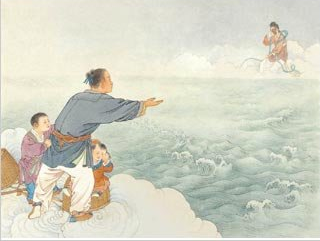
Overwhelmed with grief, the weaver maid and cowherd cried tears of rain. Seeing their pain, the Emperor and Empress took pity on them, allowing them to come back together once a year. On that day a flock of magpies flies over the Silver River, forming a bridge and letting the family reunite.
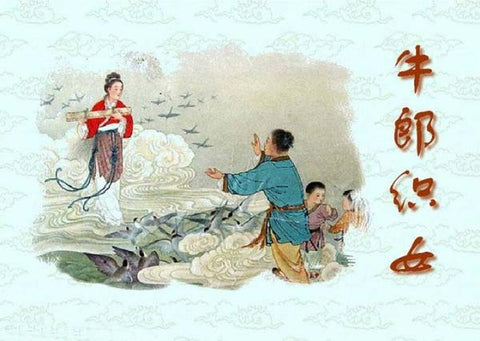
Just as the Milky Way stands for the Silver River, certain stars stand for the cast of characters — Vega for the weaver maiden, Altair for the cowherd, and Altair’s flanking stars, Beta and Gamma Aquilae, for their children.
Praying for skills and dangerous dumpling eating
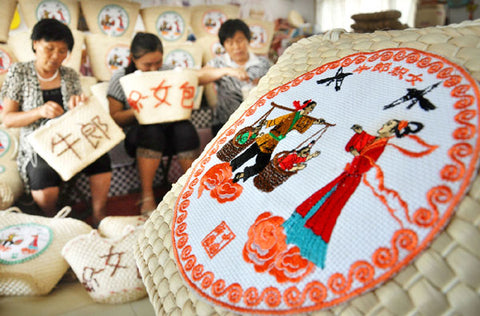
Photograph via China Daily
So what do people do to celebrate the holiday? In the past, girls prayed to the weaver maiden for sewing skills and true love. In some parts of China, they knew she was listening if a spider wove a web on a sacrificial object.
Girls also held sewing and weaving competitions, and gave offerings of fruit and other goodies, including “skill fruit” which are actually thin pastries in various shapes. Not to be forgotten, sometimes the matchmaking ox is honored by children hanging wildflowers on the horns of oxen.
In some regions, seven friends would gather to make dumplings, being sure to include a needle, coin, and date in the mix. Whoever received the three lucky dumplings would gain, respectively, dexterity in needlework, good fortune, and an early marriage. (And hopefully not an involuntary tongue piercing or broken tooth.)
Nowadays, the practices more resemble western Valentine’s Day with romantic outings and gifts of chocolates and flowers, although in some parts of China, women still honor the couple by showing off their sewing skills.
Korea, Japan ... and Google
The holiday has inspired festivals in both Korea and Japan. The Korean Chilseok festival, like Qixi, falls on the seventh day of the seventh lunar month. But instead of sewing competitions and risky needle-dumpling eating, Koreans would take baths for good health and enjoy wheat flour noodles and grilled wheat cake.
In Japan, Tanabata festivities begin on July 7 of the western calendar and run throughout July and August. The old customs are similar to the Chinese ones: girls hoped for better sewing skills and boys for better handwriting by composing wishes on strips of paper.
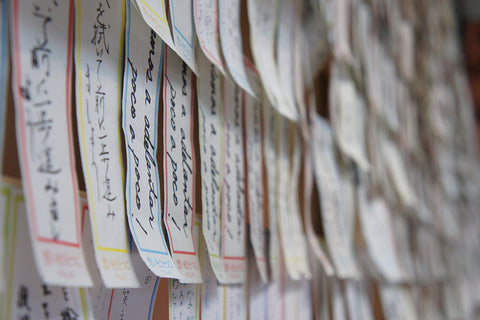
"Strips of paper written one’s wish : Sendai Tanabata," by Yuichi Shiraishi, CC BY 2.0
Today people still write wishes but rather than a swift needle and neat penmanship, they wish for a good future for the earth and give thanks for what they have. The wishes are sometimes written in tanzaku, a form of poetry, and the papers hung on bamboo. After the festival, the bamboo and other decorations are either set afloat on a river or burned.
In addition to decoration competitions, Tanabata festivals may involve parades, Miss Tanabata contests, and of course a lot of food. The festivals are all over Japan, but the most famous is in Sendai, where there are seven types of paper decorations: strips for wishes, purses for good business, nets for good fishing, trash bags for cleanliness, and decorative kimonos, cranes, and streamers.
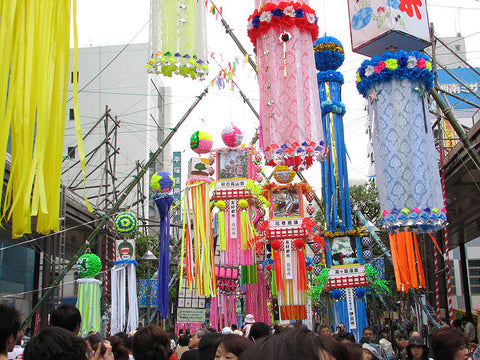
"IMG_0120," by kazuletokyoite, CC BY 2.0
Even Google got in on the Qixi action last year with a beautiful Google Doodle.
Learn more
Want to learn even more about Chinese festivals and traditions? Check out our posts on the Qingming Festival, Chinese wedding traditions, and the Lunar New Year, from what foods to eat, how to get lucky, and some things you didn’t know about the Chinese zodiac.
